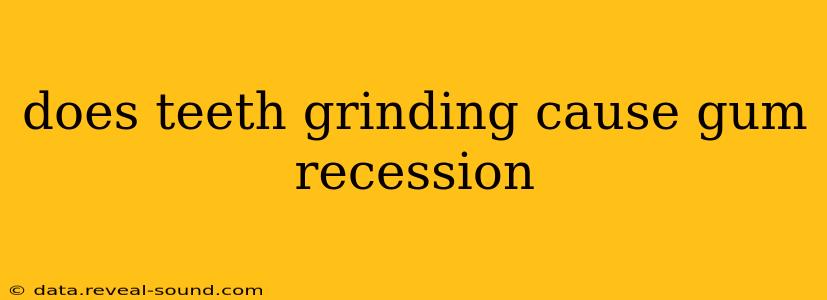Teeth grinding, also known as bruxism, is a common condition that can have significant consequences for your oral health. One frequently asked question is whether it contributes to gum recession. The answer is complex, and the short version is: yes, it can, but it's not the only factor.
Bruxism involves clenching or grinding your teeth, often unconsciously, particularly during sleep. This excessive force puts stress on various parts of your mouth, and this stress can indeed lead to gum recession, but it's usually an indirect cause. Let's explore this in more detail.
How Teeth Grinding Can Lead to Gum Recession
Teeth grinding doesn't directly cause gum recession in the same way as, say, aggressive brushing. Instead, it creates a chain reaction:
-
Increased Tooth Wear: The constant pressure from grinding wears down the enamel and dentin of your teeth. This can lead to shorter teeth, exposing more of the root surface.
-
Bone Loss: Prolonged, intense grinding can damage the periodontal ligaments (the tissues that hold your teeth in place) and the alveolar bone (the bone supporting your teeth). This bone loss is a primary contributor to gum recession.
-
Increased Pressure on the Gums: The added force on the teeth transmits to the surrounding gums, potentially damaging the soft tissues and contributing to recession.
-
Inflammation and Periodontal Disease: The increased stress and damage can lead to gum inflammation (gingivitis) and, if left untreated, periodontal disease. Periodontal disease is a major cause of gum recession.
Therefore, while bruxism doesn't directly push back the gum line, the secondary effects of tooth wear, bone loss, and inflammation created by the grinding significantly increase the risk of gum recession.
Other Factors Contributing to Gum Recession
It's crucial to remember that gum recession is rarely caused by one single factor. Several other issues can contribute, including:
- Aggressive Brushing: Harsh brushing techniques can damage gum tissue over time.
- Genetics: Some people are genetically predisposed to gum recession.
- Hormonal Changes: Fluctuations in hormone levels, especially during pregnancy or menopause, can affect gum health.
- Gum Disease (Periodontitis): This bacterial infection is a leading cause of gum recession.
- Improper Flossing: Ineffective flossing can lead to plaque buildup, contributing to gum disease.
- Smoking: Smoking negatively impacts gum health and healing processes.
- Certain Medications: Some medications list gum recession as a side effect.
Can I Prevent Gum Recession Caused by Teeth Grinding?
While you can't completely eliminate the risk if you grind your teeth, you can significantly reduce it. The key is to address the underlying cause—the bruxism itself:
- Mouthguard: A custom-fitted nightguard from your dentist is the most effective way to protect your teeth from the wear and tear of grinding.
- Stress Management: Since stress is often a trigger for bruxism, exploring stress-reduction techniques like yoga, meditation, or therapy can be beneficial.
- Lifestyle Changes: Avoiding caffeine and alcohol before bed can sometimes help.
- Regular Dental Checkups: Regular visits to your dentist allow for early detection and treatment of any gum problems or bruxism-related damage.
What if I Already Have Gum Recession?
If you're experiencing gum recession, regardless of the cause, it's crucial to consult your dentist. They can assess the extent of the recession, identify the underlying causes, and recommend appropriate treatment options. These might include gum grafts, scaling and root planing, or other procedures to improve your gum health and prevent further recession.
Can a night guard stop gum recession?
Yes, a night guard can significantly help prevent further gum recession caused by bruxism. By protecting your teeth from the damaging forces of grinding and clenching, a night guard reduces the risk of tooth wear, bone loss, and the subsequent gum recession associated with these issues. However, it won't reverse existing gum recession.
Does grinding teeth cause receding gums and bone loss?
Yes, chronic teeth grinding can contribute to both receding gums and bone loss. The constant pressure and force from grinding can damage the periodontal ligaments and alveolar bone that support your teeth, resulting in both gum recession and bone loss.
By understanding the link between teeth grinding and gum recession, you can take proactive steps to protect your oral health and maintain a beautiful, healthy smile. Remember to consult your dentist for personalized advice and treatment.
